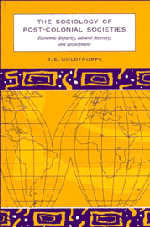Book contents
- Frontmatter
- Contents
- Preface and acknowledgements
- 1 Introduction and argument
- 2 Technology, society, and population
- 3 The colonial episode and the race question
- 4 Economic conditions
- 5 Environmental concerns
- 6 The social sciences and the ‘Third World’
- 7 The rise of towns
- 8 Family life in a changing world: two studies
- 9 Cultural diversity, language, education, and communications
- 10 Religion and development
- 11 Individual modernization: some psychological studies
- 12 Politics in post-colonial states
- 13 Aid and development
- Notes
- Index
6 - The social sciences and the ‘Third World’
Published online by Cambridge University Press: 03 May 2011
- Frontmatter
- Contents
- Preface and acknowledgements
- 1 Introduction and argument
- 2 Technology, society, and population
- 3 The colonial episode and the race question
- 4 Economic conditions
- 5 Environmental concerns
- 6 The social sciences and the ‘Third World’
- 7 The rise of towns
- 8 Family life in a changing world: two studies
- 9 Cultural diversity, language, education, and communications
- 10 Religion and development
- 11 Individual modernization: some psychological studies
- 12 Politics in post-colonial states
- 13 Aid and development
- Notes
- Index
Summary
Before the Second World War, the only social scientists to take much interest in the countries later known as the ‘Third World’ were the social anthropologists. For them, indeed, the 1920s and 1930s represented the golden age of the classic field studies, of Tikopia and Samoa, the Bemba, the Nuer, and the Azande. Evolutionism was rejected, and the prevailing approach was functional and comparative. Here were peoples with their own ways of doing things, different from ‘ours’ (that is, the western societies from which most of the anthropologists came), yet viable, internally consistent, and not irrational, enabling them to meet their basic needs and survive. Although changes in the cultures and social structures they studied were not always entirely neglected, many anthropologists aspired to be early on the scene in their search for what Margaret Mead termed ‘untouched societies’ before these had been much affected by colonial administration, missions, schools, labour migration, and other outside influences.
From about 1950 onwards, however, all that changed. Political scientists, who had taken little interest in colonies and regarded their government as mere administration, not politics, suddenly became aware of the political scene in the newly independent states of Asia and Africa. Among economists there was a similar awakening; whereas in the 1930s the supreme economic problem had been seen as that of mass unemployment in the West, by the 1950s a similar challenge was presented to a new generation by ‘the hideously great, and alas, ever widening disparity between the standards of living in the rich, developed countries and the poor, underdeveloped countries of the world’.
- Type
- Chapter
- Information
- The Sociology of Post-Colonial SocietiesEconomic Disparity, Cultural Diversity and Development, pp. 109 - 132Publisher: Cambridge University PressPrint publication year: 1996



